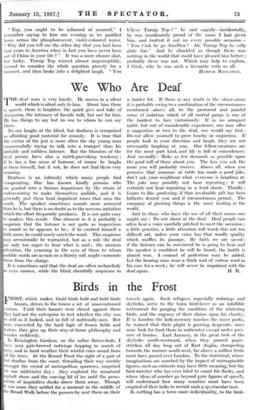We Who Are Deaf
/1HE deaf man is very lonely. He moves in a silent world which is silent only to him. About him there is speech, there is laughtet, the quick give and take of discussion, the intimacy of fireside talk, but not for him. He has things to say but no one to whom he can say them.
No one laughs at the blind, hilt deafness is recognized as affording good material for comedy. It is true that the victim of the jest is more often the shy young man unsuccessfully trying to talk into a trumpet than his irritable and ruthless listener. But the blunders of the deaf person have als0 a mirth-provoking tendency ; if he hag a fine sense of humour, of course he laughs at them himself, but if not, he does not find them very amusing.
Deafness is an infirmity which many people find exasperating. One has known kindly persons who are goaded into a furious impatience by the strain of endeavouring to make themSelves audible, and it is generally just these loud impatient tones that miss the mark. The speaker sometimes sounds more annoyed than he is, but there is no doubt as to the nervous irritation which the effort frequently produces. It is not quite easy to analyse this result. One element in it is probably a suspicion that the listener is not quite as impervious to sound as he appears to be ; if he exerted himself a ittle more, he could surely catch the word. This suspicion lay occasionally be warranted, but as a rule the deaf are only to eager. to hear what is said ; the anxious attention, the yearning. in the eyes of those to whom audible words are as rain on a-thirsty soil, might exonerate hem from the charge. . .
It is sometimes said that the deaf are often melancholy r even morose, while the blind cheerfully acquiesce in a harder lot. If there is any truth in the observation it is probably owing to a combination of the circumstances mentionedabove all, to the profound and painful sense of isolation which of all mortal pangs is one of the hardest to face victoriously. If in no arrogant spirit, but out of considerable experience, one may offer a suggestion or two to the deaf, one would say first : Do not allow yourself to grow touchy or suspicious. If people look in your direction and laugh, they are not necessarily laughing at you. Our fellow-creatures arc for the most part kind, and life is full of coincidences. And secondly : Make as few demands as possible upon the good will of those about you. The less you ask the more you will probably receive. Above all, when you perceive that someone at table has made a good joke, don't ask your neighbour' what everyone is laughing at. ' The joke may possibly not bear repeating ; it will certainly not bear repeating in a loud shout. Thirdly : Leain to like gardening, if that invaluable gift has been hitherto denied' you and if circumstances permit. The company of growing things is the most healing in the world.
And to those who have the use of all their senses one might say : Do not shout at the deaf. Deaf people can often hear a voice carefully pitched to meet the occasion ; 'a little practice, a little attention will teach this not too difficult art, unless your voice has that woolly quality which muffles its passage. By faith we are saved ; if the listener can be convinced he is going to hear and the speaker is confident he will be heard, the battle is almost won. A counsel of perfection may be added. Let the hearing man wear a thick wad of cotton wool iii his ears for a week ; he will never be impatient with the


































 Previous page
Previous page